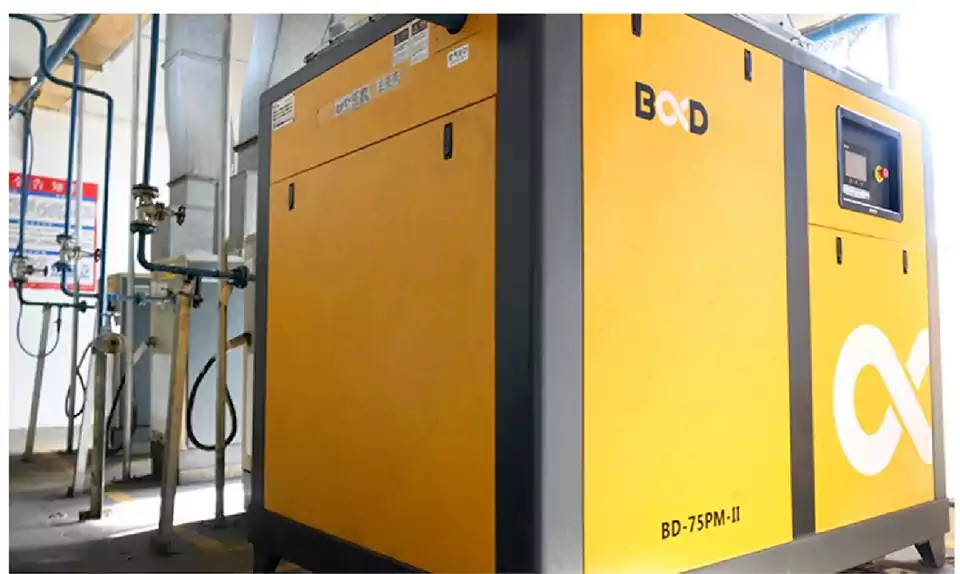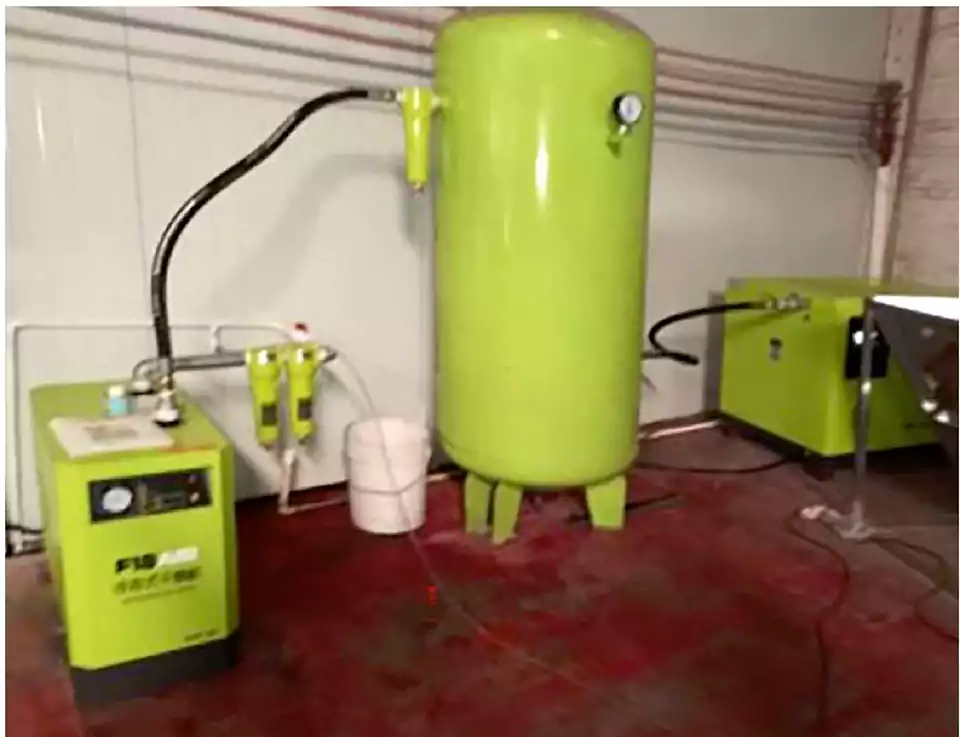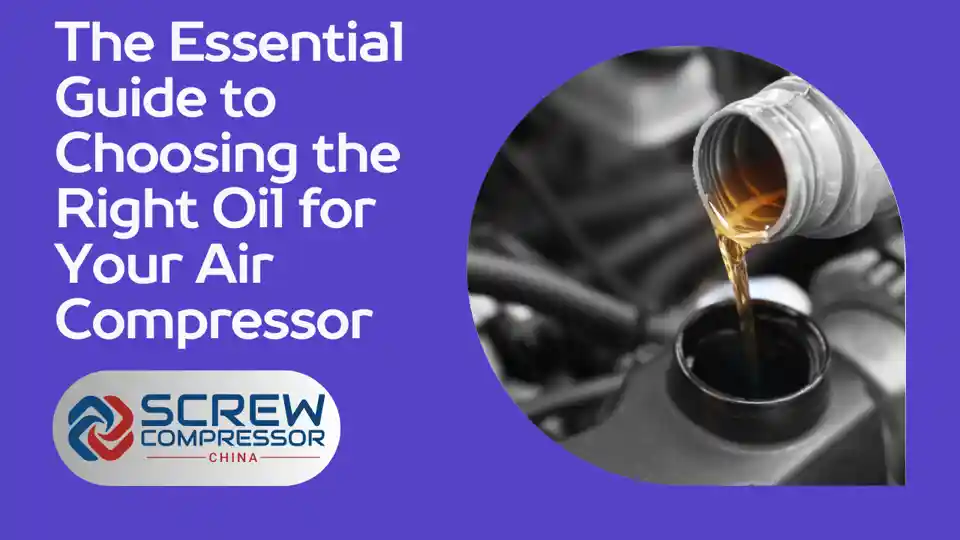
Choosing the right oil for your air compressor is crucial for optimizing its efficiency and prolonging its lifespan. This guide provides a comprehensive overview of the different types of compressor oils and offers practical advice for selecting the ideal oil based on your compressor’s requirements and operating conditions.
Selecting the appropriate oil for your air compressor is a critical decision that can significantly impact its performance, longevity, and overall cost of ownership. Using the wrong type of oil or failing to maintain proper oil levels can lead to increased wear and tear, reduced efficiency, and even premature failure of your compressor’s components.
To ensure that your rotary screw air compressor operates at its best, it’s essential to understand the different types of compressor oils available and their specific properties. This knowledge will help you make an informed decision when choosing the oil that best suits your compressor’s needs, taking into account factors such as the operating environment, temperature range, and performance requirements.

Moreover, regularly monitoring and changing your compressor oil is just as important as selecting the right type. Over time, oil can become contaminated with moisture, dirt, and other particles, reducing its effectiveness and potentially causing damage to your compressor.
By establishing a proper maintenance schedule and following the manufacturer’s recommendations, you can ensure that your air compressor remains in top condition and operates efficiently for years to come.
In this comprehensive guide, we will delve into the various types of compressor oils, including synthetic, mineral, and food-grade options. We’ll discuss their unique characteristics, advantages, and limitations, helping you determine which oil is best suited for your specific application.
Additionally, we’ll provide practical tips on how to monitor and maintain your compressor oil, as well as answer some frequently asked questions to help you make the most of your air compressor investment.
Types of Compressor Oils
There are several types of compressor oils available on the market, each with its own unique properties and benefits. Understanding the differences between these oils is essential for selecting the one that best suits your air compressor’s needs. The three main types of compressor oils are synthetic, mineral, and food-grade.
Synthetic Compressor Oil
Synthetic compressor oil is designed for high performance, offering excellent lubrication, resistance to oxidation, and functionality across a wide temperature range. This oil is ideal for demanding applications and extreme conditions.
Synthetic compressor oils are engineered to provide superior performance and protection compared to traditional mineral oils. These oils are created using advanced chemical processes that allow for the customization of their molecular structure, resulting in a range of benefits for your air compressor.
One of the primary advantages of synthetic compressor oil is its ability to maintain stable viscosity across a wide temperature range. This means that the oil remains fluid and effective in both low and high-temperature environments, ensuring proper lubrication and reducing wear on your compressor’s components.
Synthetic oils also have a higher resistance to oxidation and thermal breakdown, which helps to extend the oil’s life and minimize the formation of sludge and deposits.
In addition to their performance benefits, synthetic compressor oils often have extended drain intervals compared to mineral oils. This means that you can run your compressor for longer periods without needing to change the oil, reducing maintenance costs and downtime.
However, it’s important to note that synthetic oils are generally more expensive than their mineral counterparts, so the long-term cost savings should be weighed against the initial investment.
When considering synthetic compressor oil, it’s crucial to consult your air compressor’s manufacturer guidelines to ensure compatibility. Some compressors may have specific requirements or recommendations regarding the use of synthetic oils, so always defer to the manufacturer’s expertise to protect your equipment and maintain your warranty.
Mineral Air Compressor Oil
Mineral air compressor oil, also known as standard oil, is a cost-effective solution for general air compressor use. It is suitable for less extreme operating environments and is widely available.
Mineral air compressor oils are derived from refined crude oil and are the most common type of oil used in air compressors. These oils are known for their affordability and wide availability, making them a popular choice for many compressor owners.
While mineral oils may not offer the same level of performance as synthetic alternatives, they are still an effective choice for most general-purpose air compressor applications. Mineral oils provide adequate lubrication and protection for compressor components, helping to reduce friction and wear while dissipating heat.
One of the main advantages of mineral air compressor oil is its cost-effectiveness. These oils are generally less expensive than synthetic options, making them an attractive choice for those on a budget or with less demanding compressor applications.
However, it’s important to keep in mind that mineral oils may require more frequent changes and have shorter drain intervals compared to synthetic oils, which can impact long-term maintenance costs.
Mineral air compressor oils are best suited for compressors operating in moderate temperature ranges and environments. They may not provide the same level of protection and stability as synthetic oils in extreme cold or heat, so it’s essential to consider your compressor’s operating conditions when making a decision.
As with any compressor oil, always consult your air compressor’s manufacturer guidelines to ensure that a mineral oil is compatible with your specific model. Some manufacturers may recommend specific brands or formulations to ensure optimal performance and longevity of your equipment.
Food-Grade Compressor Oil
For compressors used in the food service industry or where there might be contact with consumables, food-grade compressor oil is essential. This type of oil ensures safety and compliance with health regulations.
Food-grade compressor oils, also known as NSF H1 certified oils, are specially formulated to be safe for use in applications where there is a possibility of incidental food contact. These oils are crucial for air compressors used in food processing, packaging, and storage facilities, as well as in the pharmaceutical and cosmetic industries.
The primary difference between food-grade compressor oils and standard oils is the additives used in their formulation. Food-grade oils are made with additives that are non-toxic and safe for human consumption, in case of accidental contact with food products.
These oils undergo rigorous testing and certification processes to ensure they meet the strict standards set by regulatory bodies such as the NSF (National Sanitation Foundation) and the FDA (Food and Drug Administration).
Using a food-grade compressor oil is not only a matter of safety but also a legal requirement in many industries. Failing to use the appropriate oil can result in contamination of food products, leading to costly recalls, legal consequences, and damage to a company’s reputation.
Therefore, it’s essential to ensure that your air compressor is equipped with the proper food-grade oil if your facility is involved in any food-related applications.

When selecting a food-grade compressor oil, it’s important to look for the NSF H1 certification on the product label. This certification ensures that the oil has been rigorously tested and approved for use in food-contact applications.
Additionally, consult your air compressor’s manufacturer guidelines to determine the specific viscosity and formulation requirements for your model, as using the wrong oil can lead to reduced performance and equipment damage.
It’s also crucial to maintain proper storage and handling procedures for food-grade compressor oils to prevent contamination. This includes storing the oil in a clean, dry, and cool environment away from potential contaminants, as well as using dedicated equipment for oil changes and maintenance to avoid cross-contamination with non-food-grade oils.
Choosing the Best Air Oil for Your Compressor
The selection between synthetic, mineral, or food-grade oil often depends on several factors including the compressor’s operating environment, temperature conditions, and performance requirements. Here are key considerations:
Performance and Efficiency
For high-performance and energy-efficient operation, synthetic compressor oils are preferable. They reduce friction and wear, enhance energy efficiency, and are effective across various temperature ranges.
When it comes to maximizing your air compressor’s performance and efficiency, synthetic compressor oils are often the best choice. These specially formulated oils offer a range of benefits that can help extend the life of your equipment, reduce energy consumption, and minimize maintenance requirements.
One of the primary advantages of synthetic compressor oils is their ability to reduce friction and wear on critical components. The unique molecular structure of synthetic oils allows them to form a durable protective film on surfaces, minimizing metal-to-metal contact and preventing wear.
This not only helps to extend the life of your compressor’s components but also reduces the amount of energy required to overcome friction, leading to improved overall efficiency.
Synthetic oils also have a higher thermal stability compared to mineral oils, meaning they can maintain their viscosity and protective properties across a wider temperature range. This is particularly important for air compressors operating in extreme cold or hot environments, as the oil must continue to flow and lubricate effectively to prevent damage.
By maintaining stable viscosity, synthetic oils help ensure consistent performance and efficiency, even under challenging conditions.
In addition to their protective properties, synthetic compressor oils can also contribute to improved energy efficiency. The reduced friction and enhanced flow characteristics of these oils allow your compressor to operate with less resistance, requiring less energy to compress air.
Over time, this can lead to significant energy savings and lower operating costs, especially for facilities with high compressed air demands.
When selecting a synthetic compressor oil for optimal performance and efficiency, it’s essential to choose a product that is specifically formulated for your compressor type and application. Look for oils with high-quality base stocks and advanced additive packages that provide superior wear protection, oxidation resistance, and thermal stability.
Consulting with your compressor manufacturer or a lubrication specialist can help you identify the best synthetic oil options for your specific needs.
Cost and Availability
If budget is a concern and the operating conditions are moderate, standard mineral oils may be the best choice. They are less expensive and are readily available in the market.
For many air compressor owners, cost and availability are significant factors when choosing a lubricant. While synthetic oils offer superior performance and protection, they often come with a higher price tag. In situations where budget is a primary concern, and the compressor operates in moderate conditions, standard mineral oils can be a suitable alternative.
Mineral oils, derived from refined crude oil, are the most common and widely available type of compressor lubricant. These oils are produced by many manufacturers and can be found at most industrial supply stores, making them easy to source for regular maintenance and oil changes.
The widespread availability of mineral oils also contributes to their lower cost compared to synthetic options.
When considering mineral oils for your air compressor, it’s important to ensure that the operating conditions are moderate. Mineral oils may not provide the same level of protection and performance as synthetic oils in extreme temperatures or demanding applications.
However, for compressors used in typical industrial or workshop settings with reasonable temperature ranges and humidity levels, mineral oils can be a cost-effective choice.
It’s crucial to select a high-quality mineral oil that meets the specifications recommended by your compressor manufacturer. Look for oils with the appropriate viscosity grade and additives that provide adequate wear protection, corrosion resistance, and oxidation stability.
While some lower-cost mineral oils may be tempting, using a subpar product can lead to increased wear, reduced efficiency, and shorter compressor life, ultimately costing more in the long run.
When using mineral oils, it’s also important to adhere to the manufacturer’s recommended oil change intervals. Mineral oils may require more frequent changes compared to synthetic oils, as they are more susceptible to oxidation and contamination.
Regularly monitoring oil condition and following a proper maintenance schedule can help extend the life of your compressor and ensure efficient operation.
Ultimately, the decision between mineral and synthetic oils depends on your specific needs, budget, and operating conditions. While mineral oils can be a cost-effective choice for moderate applications, investing in synthetic oils may be warranted for more demanding or critical uses where maximum protection and performance are required.
Compatibility and Longevity
It’s essential to consider the oil’s compatibility with your compressor’s components. Petroleum-based oils are generally compatible with most compressors, but always check the manufacturer’s recommendations.
Ensuring compatibility between your chosen compressor oil and your equipment is crucial for maintaining optimal performance and longevity. Using an incompatible oil can lead to a range of issues, from reduced efficiency and increased wear to complete compressor failure. Therefore, it’s essential to carefully consider the oil’s compatibility with your compressor’s components and always follow the manufacturer’s recommendations.
Petroleum-based oils, including both mineral and synthetic options, are generally compatible with most air compressors. These oils are formulated to work with the common materials found in compressor components, such as metals, seals, and gaskets.
However, compatibility can vary depending on the specific make and model of your compressor, as well as any unique design features or materials used.
To ensure compatibility, start by consulting your air compressor’s owner’s manual or reaching out to the manufacturer directly. They will provide detailed information on the recommended oil types, viscosity grades, and any specific brand or product requirements.
Following these guidelines is essential for maintaining your warranty and preventing any damage caused by using an incompatible oil.
In some cases, manufacturers may recommend a specific brand or formulation of oil that has been tested and approved for use in their compressors. While using a different brand with the same specifications may seem like a cost-effective alternative, it’s important to remember that the recommended oil has been validated for compatibility and performance.
Deviating from these recommendations can introduce unnecessary risks and potentially void your warranty.
When considering the longevity of your compressor, the choice of oil plays a significant role. High-quality, compatible oils can help extend the life of your compressor by reducing wear, preventing corrosion, and maintaining efficient operation.
Synthetic oils, in particular, are known for their enhanced durability and extended drain intervals, which can help reduce maintenance costs over time.

Regular oil analysis can also help ensure compatibility and longevity by monitoring the condition of your oil and identifying any potential issues before they cause significant damage. By tracking key parameters such as viscosity, contamination levels, and oxidation, you can optimize your oil change intervals and address any compatibility concerns early on.
In summary, selecting a compatible oil is crucial for maintaining the performance and longevity of your air compressor. Always follow the manufacturer’s recommendations, use high-quality oils, and consider regular oil analysis to ensure your compressor operates at its best for years to come.
Frequently Asked Questions
Q: What is synthetic compressor oil?
A: Synthetic compressor oil is a chemically engineered oil known for its superior performance and protection in extreme conditions.
Synthetic compressor oil is a specially formulated lubricant designed to provide optimal performance and protection for air compressors. Unlike conventional mineral oils derived from crude oil, synthetic oils are created through a complex chemical process that allows for precise control over the oil’s molecular structure and properties.
The key advantages of synthetic compressor oil include:
- Enhanced thermal stability: Synthetic oils maintain their viscosity and lubricating properties across a wide temperature range, ensuring reliable performance in both cold starts and high-temperature operation.
- Improved oxidation resistance: The unique formulation of synthetic oils resists breakdown due to oxidation, extending the oil’s life and reducing the formation of sludge and deposits.
- Superior wear protection: Synthetic oils contain advanced additives that form a durable protective film on metal surfaces, minimizing friction and wear on critical compressor components.
- Extended drain intervals: The enhanced stability and cleanliness of synthetic oils allow for longer intervals between oil changes, reducing maintenance costs and downtime.
- Energy efficiency: The low friction properties of synthetic oils can help improve compressor efficiency, leading to energy savings and reduced operating costs.
When selecting a synthetic compressor oil, it’s essential to choose a product that meets the specifications recommended by your compressor manufacturer. Look for oils with the appropriate viscosity grade and performance characteristics for your specific make and model.
While synthetic oils typically come at a higher initial cost compared to mineral oils, their superior performance and extended life often make them a cost-effective choice in the long run. The enhanced protection and reliability provided by synthetic oils can help extend the life of your compressor, reduce maintenance requirements, and minimize the risk of unexpected downtime.
As with any compressor maintenance decision, it’s important to consider your specific needs, operating conditions and budget when selecting the right oil for your rotary screw air compressor. By understanding the properties and benefits of each type of oil, you can make an informed choice that will help optimize your compressor’s performance, extend its lifespan, and minimize environmental impact.
Q: How often should I change my compressor oil?
A: The frequency of oil changes depends on factors such as the type of oil used, the compressor’s operating conditions, and the manufacturer’s recommendations. As a general rule, mineral oils may require more frequent changes compared to synthetic oils. Always consult your compressor’s manual for specific guidance on oil change intervals.
Proper Disposal of Used Compressor Oil
When it comes time to change your compressor oil, it’s crucial to dispose of the used oil properly to minimize environmental impact and comply with local regulations. Used compressor oil can contain contaminants and additives that can be harmful if released into the environment.
Recycling Used Compressor Oil
The best way to dispose of used compressor oil is to recycle it. Many auto parts stores, service stations, and recycling centers accept used oil for recycling. These facilities have the proper equipment and processes to safely handle and recycle the oil, ensuring that it doesn’t end up in landfills or waterways.
When recycling your used compressor oil, be sure to:
- Store the used oil in a clean, leak-proof container
- Keep different types of oils (e.g., compressor oil, motor oil) separate
- Label the container clearly as “Used Oil“
- Take the oil to a designated collection point for recycling
Proper Disposal of Oil Filters
In addition to recycling used oil, it’s important to dispose of oil filters correctly. Oil filters can contain residual oil and other contaminants that can harm the environment if not handled properly. To dispose of your used oil filters, you can:
- Puncture and hot-drain the filter, allowing the oil to drain completely before recycling the metal components
- Crush the filter using a mechanical device to remove excess oil, then recycle the remaining metal
- Take the used filter to a recycling center or service station that accepts them for proper disposal
Always check with your local regulations and recycling facilities for specific guidelines on disposing of used oil filters.
The Benefits of Proper Used Oil Disposal
By recycling your used compressor oil and disposing of oil filters correctly, you can:
- Reduce environmental impact by keeping harmful contaminants out of landfills and waterways
- Conserve natural resources by allowing used oil to be refined into new lubricants or fuels
- Comply with local, state, and federal regulations regarding waste oil disposal
- Demonstrate your commitment to environmental stewardship and sustainability
Conclusion
Choosing the right oil for your air compressor and disposing of used oil properly are essential aspects of compressor maintenance. By understanding the different types of compressor oils available and their properties, you can select the best option for your specific needs and operating conditions. When it comes time to change your oil, always recycle used oil and dispose of filters correctly to minimize environmental impact and comply with regulations. By following these best practices, you can optimize your compressor’s performance, extend its lifespan, and demonstrate your commitment to sustainability.
